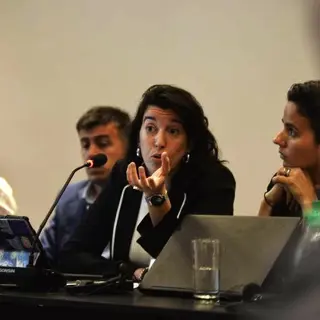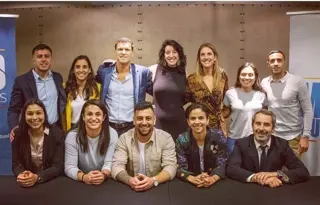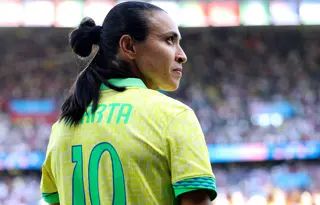News
People of the Union: Maria Florencia Chirico (Uruguay)

People of the Union puts the spotlight on individuals across FIFPRO’s member associations who are dedicated to improving the wellbeing of professional footballers.
Maria Florencia Chirico talks about her legal work with Uruguayan player union MUFP, how she stays motivated as a woman working in the football industry, and why Brazil’s Marta is her football heroine.
FIFPRO: Tell us about yourself: what’s your current role and what’s your background?
Maria Florencia Chirico: I’m a lawyer and notary public, and since 2017 I’ve worked as a legal advisor at the Uruguayan Footballers’ Union. My main responsibilities involve legal defence and support for players in various situations – from contract advice to labour disputes, unpaid wages, or discrimination cases. I also actively participate in defending and promoting these rights before the national federation. It’s a highly dynamic job, where no two days are the same, and that’s exactly what makes it as challenging as it is rewarding.
What issue affecting player welfare are you most passionate about?
One of the issues that concerns me most, from both a contractual and regulatory point of view, is the timely and proper payment of wages. Even though there have been major improvements in recent years in Uruguay — and I would say across much of South America — it’s still a recurring issue we deal with every day.
I also believe that addressing mental health is essential. It’s often invisible in a footballer’s career, yet it has a direct impact on their quality of life, both on and off the pitch. Breaking the stigma and creating safe, supportive spaces for emotional care is a priority in our daily work.

Can you share one of your proudest moments or achievements working as a union representative?
One of the most meaningful moments for me was supporting a squad of players, nine of whom were unfairly excluded from the first team in retaliation for raising concerns about their working conditions.
It was an emotional case, not only because of the legal complexity, but also due to the unity and solidarity shown by the entire team. Our support was holistic: legal, emotional, and human. We achieved justice in formal terms but also built a strong synergy with both the affected players and the squad as a whole. It’s moments like these that fuel my commitment to the work.
Who are the women — inside or outside of football — who have inspired your journey in this space?
In football, I’ve had the privilege of meeting many inspiring women—colleagues, players, and leaders who persevere daily in challenging environments, carving out their place in a space that remains deeply male-dominated. Outside of football, I’m deeply inspired by women activists who have bravely and boldly transformed historically unequal structures. I especially admire those who blaze a trail while extending a hand to others along the way.
How do you stay motivated as a woman in the football industry?
In moments of frustration, I remind myself that every step forward, no matter how small, helps open the path for many others. I’m motivated by the growing number of women in the football industry who share deep convictions and by the fact that — even if progress can feel slow — change is happening. Collective action and community-building are key to staying the course.

What’s an emerging issue for players that you believe needs more attention?
Without a doubt, the transition out of professional football. Many players who’ve been able to make a living from football are simply not prepared — emotionally or financially — for the moment their careers end, which often comes earlier than expected. At the Uruguayan Footballers’ Union, we’re working on the creation of a retirement fund that provides players with dignified financial support alongside psychological and social assistance. It’s an urgent and necessary challenge.
What’s your favourite football memory — whether as a fan, player, or union representative?
As a union representative, one of my most powerful memories is the successful reform of the Uruguayan Footballers’ Statute after nearly 14 years. The reform secured new rights and brought significant improvements in wages, working conditions, and legal protections. These kinds of collective achievements — those that have a real, lasting impact — move me far more than any sporting result.
Who’s your ultimate football heroine, and what makes her special to you?
Marta. Not only for what she has accomplished on the pitch, which is extraordinary, but for the path she had to walk to get there. Marta comes from a very difficult background, with few resources, in a context where being a woman and wanting to play football was almost unthinkable. Still, she persisted with admirable conviction, breaking down barriers and opening doors for entire generations.
Today, she is a global icon and a role model for thousands of footballers — not only because of her undeniable talent, but also because of her fight, her integrity, and her voice. Marta doesn’t just play — she represents. That’s what makes her unique.

Outside of football, what’s been capturing your attention or interest lately?
I’ve been increasingly interested in the intersection of human rights, labour rights, and the environment. Thinking about how we can integrate sustainability into our practices — even in the sports world — is a crucial challenge. The environmental crisis is becoming more urgent every day, and I believe we are still falling short of the deep, structural changes we need to make to reverse it.
FIFPRO is celebrating its 60th anniversary this year. What gives you hope about the future of our union work, the game, and the people who play it?
What gives me hope is the new generation of players and leaders — more aware, more engaged and more willing to challenge structures that were once accepted as “just part of the game”. If we can accompany and strengthen this transformation, the future of football will be more fair, inclusive, and healthy for players and for those who fight for their rights.
